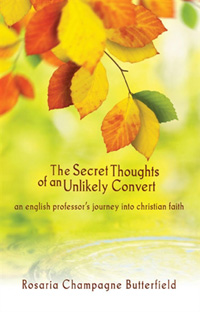“Conversion put me in a complicated and comprehensive chaos. I sometimes wonder, when I hear other Christians pray for the salvation of the ‘lost,’ if they realize that this comprehensive chaos is the desired end of such prayers. Often, people asked me to describe the ‘lessons’ that I learned from this experience. I can’t. It was too traumatic. Sometimes in crisis, we don’t really learn lessons. Sometimes the result is simpler and more profound: sometimes our character is simply transformed.” – Rosaria Butterfield
Rosaria’s story is a fascinating one, as you will see from this interview below, which took place on January 11, 2013:
“Rosaria, by the standards of many, was living a very good life. She had a tenured position at a large university in a field for which she cared deeply. She owned two homes with her partner, in which they provided hospitality to students and activists that were looking to make a difference in the world. There, her partner rehabilitated abandoned and abused dogs. In the community, Rosaria was involved in volunteer work. At the university, she was a respected advisor of students and her department’s curriculum.
And then, in her late 30s, Rosaria encountered something that turned her world upside down—the idea that Christianity, a religion that she had regarded as problematic and sometimes downright damaging, might be right about who God was, an idea that flew in the face of the people and causes that she most loved. What follows is a story of what she describes as a ‘train wreck’ at the hand of the supernatural. These are her secret thoughts about those events, written as only a reflective English professor could.”
 Dr. Carl Trueman writes this concerning her book The Secret Thoughts of an Unlikely Convert – An English Professor’s Journey into Christian Faith, “This autobiography is the launchpad for numerous sophisticated reflections on the nature of life, faith, sexuality, worship, education and other matters. As one would expect from a lover of nineteenth century literature, the book is also beautifully written with many a well-turned sentence; and as one would expect from someone schooled at the highest levels in critical theory, it eschews simplistic pieties for stimulating analyses of both Christian and non-Christian culture. I cannot recommend this book highly enough. I do not agree with everything she says; but I did learn from everything she wrote. It deserves the widest possible readership.” It is available here.
Dr. Carl Trueman writes this concerning her book The Secret Thoughts of an Unlikely Convert – An English Professor’s Journey into Christian Faith, “This autobiography is the launchpad for numerous sophisticated reflections on the nature of life, faith, sexuality, worship, education and other matters. As one would expect from a lover of nineteenth century literature, the book is also beautifully written with many a well-turned sentence; and as one would expect from someone schooled at the highest levels in critical theory, it eschews simplistic pieties for stimulating analyses of both Christian and non-Christian culture. I cannot recommend this book highly enough. I do not agree with everything she says; but I did learn from everything she wrote. It deserves the widest possible readership.” It is available here.
